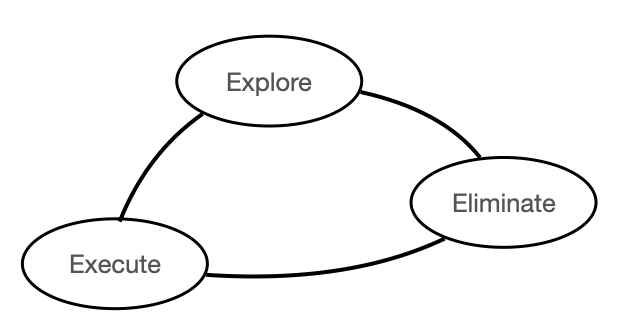| |
|
In Essentialism, Greg McKeown outlines how to increase our contributions levels by doing less and focusing on what truly matters.
Takeaway Points
Definitions
Essentialism: only once you give yourself permission to stop trying to do it all, to stop saying yes to everyone, can you make your highest contribution towards the things that really matter.
Essentialism is not about how to get more things done; it’s about how to get the right things done. The way of the Essentialist means living by design, not by default.
Decision Fatigue: the more choices we are forced to make, the more the quality of our decisions deteriorates.
If you don’t prioritize your life, someone else will. When we forget our ability to choose, we learn to be helpless. If it isn’t a clear yes, then it’s a clear no.
The Endowment Effect: our tendency to undervalue things that aren’t ours and to overvalue things because we already own them. We tend to value things that we own more than their actual value, therefore making it difficult to remove them from our ecosystem (sunk-cost fallacy). If in this situation, ask yourselft: “If I didn’t already own this, how much would I spend to buy it?”.
Nobody likes to be bored. But by abolishing any chance of being bored we lose the time we used to have to think and process.
Planning Fallacy: refers to people’s tendency to underestimate how long a task will take, even when they have actually done the task before.
The Paradox of Success
- Having clarity in our purpose enable us to achieve success.
- Once reached success we gain a reputation in a certain ambit and we get automatically exposed to a variety of options and opportunities.
- Having lots of a demands ends up consuming a lot of our time and energies therefore leading to diffused efforts (rather than focusing on the essential things).
- We become distracted from what truly matters and as a result of our success we lose what took us there in the first place.
Essentialists Mindset
- Individual Choice - we can choose how to spend our energy and time. The ability to choose cannot be taken away or even given away — it can only be forgotten.
- Almost everything is noise, and just a few things are exceptionally valuable. Essentialists explore more options than Non-essentialists before committing to any and go big on them.
- We can’t have it all or do it all. There are always tradeoffs, that’s why is important to explore the different options and keep just the most fundemental ones.

Image by author, Essentialism Decision Making steps.
Essentialist vs Non-essentialist
| Essentialist | Non-essentialist |
|---|---|
| “I choose to” | “I have to” |
| Distinguish the vital few from the trivial many | Views opportunities as basically equal |
| “What is the trade-off I want to make?” | “How can I do it all?” |
| Creates space to escape and explore life | Is too busy doing to think about life |
| Pays attention to the signal in the noise | Pays attention to the loudest voice |
| Values play and rest | Considers play and rest as un unproductive waste of time |
| “Is this exactly what I am looking for?” | “If someone I know is doing it, I should do it.” |
| Dares to say no firmly, resolutely, and gracefully. Says yes only to the things that really matter | Avoids saying no to avoid feeling social awkwardness and pressure. Says yes to everything |
| Asks, “If I weren’t already invested in this project, how much would I invest in it now?” Thinks, “What else could I do with this time or money if I pulled the plug now?” Comfortable with cutting losses | Asks, “Why stop now when I’ve already invested so much in this project?” Thinks, “If I just keep trying, I can make this work.” Hates admitting to mistakes |
| Thinks that making things better means subtracting something | Thinks that making things better means adding something |
| Knows that if you have limits you will become limitless | Thinks if you have limits you will be limited |
| Builds in a buffer for unexpected events | Assumes the best-case scenario will happen |
| Mind is focused on the present | Mind is spinning out about the past or the future (Worries about the future or stresses about the past) |
Quotes
“I saw the angel in the marble and carved until I set him free” - Michelangelo
“Kill your darlings, kill your darlings, even when it breaks your egocentric little scribbler’s heart, kill your darlings.” - Stephen King
“I must apologize: if I had more time I would have written a shorter letter.”
Book Authors: Greg McKeown
Contacts
If you want to keep updated with my latest articles and projects follow me on Medium and subscribe to my mailing list. These are some of my contacts details:
